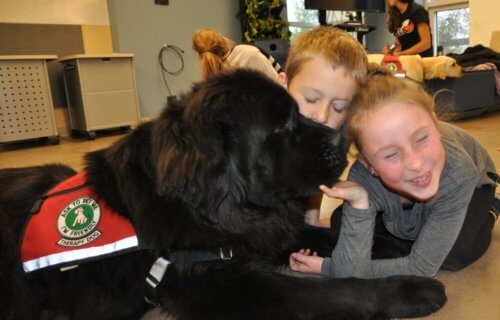KELOWNA, British Columbia — Therapy dogs improve kids’ moods, help them learn, and engage more with educational lessons. Those are the conclusions coming from a new study by researchers at the University of British Columbia, Okanagan — focusing on how children react to attending a social skill-training program with therapy dogs.
Twenty-two children took part in these sessions which help kids learn and build social skills. First, each child practiced new skills, like introducing themselves to others, with their therapy dog. Then, the children would attend a lesson with the rest of their class. After that, the kids reunited with their pups, along with a volunteer handler, to practice their newly learned skills with local university students.
“Dog lovers often have an assumption that canine-assisted interventions are going to be effective because other people are going to love dogs,” says Nicole Harris, who conducted this research while a master’s student in the School of Education, in a university release. “While we do frequently see children improve in therapy dog programs, we didn’t have data to support that they enjoyed the time as well.”
The whole course took six weeks, and each week the young participants worked on a different skill. These include speaking with others and giving directions to someone else.
“Therapy dogs are often able to reach children and facilitate their growth in surprising ways. We saw evidence of this in the social skills of children when they were paired with a therapy dog,” notes Dr. John-Tyler Binfet, director of Building Academic Retention through K9s (BARK). “The dogs helped create a non-threatening climate while the children were learning these new skills. We saw the children practice and hone their social skills with and alongside the dogs.”
Therapy dogs help young children focus and stay positive
While kids learned and practiced new social skills, researchers recorded data and took notes on their progress.
“Findings from our observations suggested that canine-assisted social and emotional learning initiatives can provide unique advantages,” Harris comments. “Our team saw that by interacting with the therapy dogs, the children’s moods improved and their engagement in their lessons increased.”
In all, 87 percent of the research team reported the children’s engagement levels as being “very or extremely engaged.”
Following the course, eight of the children returned to give their thoughts on the experience. Each child shared the same sentiment; the course would not have been as enjoyable or positive if they didn’t have the dogs there for support. Half of the kids also said the dogs helped them with their emotional well-being. For example, one child said his therapy dog helped him “become more responsible and control his silliness.”
“Dogs have the ability to provide many stress-reducing and confidence-boosting benefits to children,” Harris concludes. “It was really heartwarming to see the impact the program had on the kids.”
The study is published in the Journal of Research in Childhood Education.

